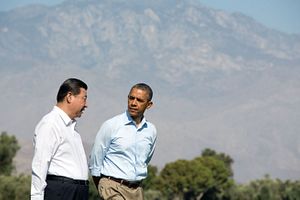Did China or the United States win the latest round of competition for influence over the Association of Southeast Asian Nations’ (ASEAN’s) position on the South China Sea? While the 10-member grouping’s joint statement issued at a summit meeting held in Laos failed to mention the Hague-based Permanent Court of Arbitration’s July ruling that declared China’s expansive “nine-dash” map claim to the contested maritime area illegal under international law, other language related to the disputes that Chinese officials reportedly bid to block from the communiqué was nevertheless included, according to press reports.
ASEAN’s ability to reach post-summit meeting agreements on what previously were pro forma and largely inconsequential joint statements has in recent years been hampered by the escalating territorial disputes in the South China Sea pitting China against ASEAN nations. Those tensions are most heated with the Philippines and Vietnam, but also include Brunei, Malaysia and Indonesia. The association’s cohesion has also been tested by China’s strong and rising influence over certain of the grouping’s members that lack direct stakes in the maritime disputes and receive lavish amounts of aid and assistance from Beijing.
In 2012, Cambodia blocked the issuance of a joint summit statement, the first time in the grouping’s then 45-year history, over references to the South China Sea that Beijing found objectionable. In July this year, Cambodia resisted any reference to the PCA ruling that favored the Philippines over China in a joint ASEAN foreign minister summit statement. The Philippines and Vietnam argued for the landmark ruling to be mentioned in a joint statement that called on all parties to the dispute to respect international law, including the United Nations Convention on the Law of the Sea, in the maritime area.
The United States has firmly backed the PCA’s authority to rule on the dispute and recognized the decision against China as “binding.” The PCA lacks any enforcement mechanism; Chinese foreign affairs officials have referred to the verdict variously as “farce,” “illegal and invalid,” and “merely a piece of paper.” In opening remarks at today’s summit, Obama said the ruling had “helped to clarify maritime rights in the region.” “I realize this raises tensions, but I also look forward to discussing how we can constructively move forward together to lower tensions and promote diplomacy and regional stability,” said Barack Obama, in what is expected to be his last tour of Asia as president.
While ASEAN may have acquiesced to China’s demands not to mention the PCA verdict in any joint statement, there were indications the grouping’s position has stiffened somewhat amid reports China is rapidly militarizing many of the islands, reefs and atolls it claims. The Associated Press, quoting an unnamed U.S. administration official, reported that China attempted to block reference to the words and phrases “recent activities,” “serious concern,” “reclamation,” “militarization,” “loss of trust,” and “need to respect legal processes,” but all were finally included in the joint statements.
While the United States may claim a certain diplomatic victory, other events around the summit signaled strategic loss. U.S.-Philippine relations, a key alliance in Washington’s efforts to maintain freedom of navigation and over-flight in the South China Sea, took a hit after Obama cancelled a scheduled meeting with President Rodrigo Duterte on the summit’s sidelines after the volatile leader referred to Obama as a “son of a bitch.” Duterte has so far taken a softer approach towards China, leading to speculation he could move to undo a security deal brokered in March by his pro-U.S. predecessor, Benigno Aquino, that will allow the United States to establish military facilities in five different areas of the country.
U.S.-Thai relations, once among Washington’s strongest in Asia, are also fraying, providing another key opening for China’s divide and rule tactics. In an apparent break with Thailand’s long-held neutrality on the disputes, deputy government spokesman Maj. Gen. Weerachon Sukondhapatipak told Reuters on Wednesday that Thailand “supports China’s efforts” at “promoting peace and stability” in the South China Sea. The statement, made on the sidelines of the summit by a junior official, came just hours after the Philippines released pictures of Chinese boats gathered at the contested Scarborough Shoal, which if built into an island and militarized by China could significantly shift the seaway’s security dynamics.
Thailand’s diplomatic shift was perhaps foreseeable. In May, U.S. Ambassador to Thailand Glyn Davies pressed Thai Foreign Minister Don Pramudwinai to take a strong public position in support of the then pending PCA verdict and to lobby fellow ASEAN states to adopt a similar stand. The meeting, however, ended without a firm Thai commitment, according to sources familiar with the situation. A month later, Prayut said in his first foreign policy speech at the Shangri-La Dialogue forum in Singapore that ASEAN should prepare to embrace a “new strategic equilibrium” where China plays a larger role in regional affairs.
It is not immediately clear if Thailand joined Cambodia (and perhaps Laos) in resisting any mention of the PCA verdict in the joint statement. What is clear is that ASEAN no longer even feigns to speak with one voice on the disputes. A joint statement released on Tuesday “took note of the concerns expressed by some leaders on the land reclamations and escalation of activities in the area, which have eroded trust and confidence, increased tensions, and may undermine peace, security and stability in the region.” Though it was not the first time the consensus-based grouping used the qualifier “some leaders” in a nominal joint statement, it nonetheless signified the divisions within ASEAN.

































